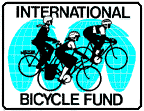Organizing a Large Bicycle Ride / Event:
Charity / Fundraising / Bike-A-Thon

![]() IBF is 100%
IBF is 100%
solar powered
![]()
There are as many ways to organize a charity/fundraising event as there are events. No two seem to have been done exactly the same. The following outline should cover about ninety percent of the major tasks. Small events won't need this much structure and large events may need more. You will need to cut, paste, edit, extend, collapse and amend to fit your local needs. Unless you know that you have access to a substantial number of appropriately skilled volunteers, it may be prudent to start with a small success event that can grow than to set your sights on too large an event that collapses.
Prepare a timeline/task matrix.
This should show tasks, when the will start and be finished and who will be
responsible for the task. Some can be handled by a single person and some will
be more successful with a working group/committee. Major and sub-headings might
be:
Overall Event Planning
Event Directors, Organizing Committee, Treasure
Define goals and objectives
Budget
(* items that can have a fiscal
impact and should be considered in the budget.)
[Tip #1: Securing donated goods and service can go a long way
to reducing the budget.]
Insurance
*
Documentation/record keeping
Concept development
Before the day of the event
Publicity (see below) -- hugely important! It can make or break an event.
*
Route Planning and Marking * (see below)
Check-in, Start / Finish Area Planning (see below)
Participant Recruitment * / Registration
*
Morning of the day of the event
Check-in [Tip #2: A smooth and efficient check-in goes a long way in creating an overall
positive feeling about the event.]
Maps and cue sheets
*
Goodie bags * (T-shirts, pins and patches, etc.)
Refreshments*
Entertainment*
Volunteer support *
Event/Course
Plan the course(s) [this may take special skills]
(if participants are young
kids a
"closed course" * is recommended (not using streets open to cars).
This can be accomplished by getting the cooperation of the local
authority to close streets or to close a park with a loop in it, or to set
the course around a school or some other campus.)
Permits, and permission
*
Communications *
Emergency Service *, first aid, rider assistances
Check-points / rest stops
*
Finish line
Post-event program
Entertainment
*
Prizes/awards*
Fundraising
Pledges
(Generally participants given instructions and forms to collect pledges
in advance,
either a flat rate or a pledge-per-kilometer or mile. Sometimes
pledges are
collected in advance (the easiest) and sometimes participants go
back to the pledgers after the event
to collect the money. Sometimes there
is an
additional entrance fee and sometimes there is a minimum amount that
participants are suppose to collect
in pledges.)
Incentives
(tiered price structure to encourage more fundraising.)
Fulfillment
Follow-up
Reports and accountability
Sponsorship
Coordinator
Develop sponsorship package
Recruit major sponsors
Recruit lesser sponsors
Solicit in-kind donations
Publicity [Tip #3: Organizers usually under staff and under fund publicity in the early years.]
Coordinator
Develop news releases, articles and advertising
Media partners
Print media
Major
Neighborhood
Organizational newsletters
Broadcast media
Electronic media (Internet)
Printed materials
*
Distribution
Direct mail
*
Past participants
New prospects
Organizational partners (clubs, civic, service, youth, etc.)
Other events and venues for getting the word out
Participant Recruitment
Coordinator
Developing forms and instructions
Online
Printing
Distribution
Registration
Pledge forms / liability release
Pledge raising manual
Participant Services
Coordinator
Communications / First Aid / Medical Support
Information booth
Check-in
Equipment * (tables, chairs, power, computers, canopies, P.A. system, etc.)
Supplies * (forms, pens, cash box, tape, staples, scissors, etc.)
Goodie bag
*
Food, water and toilets
*
Along the route
Van support
*
Each Check-point/rest stop
Equipment
* (tables, chairs, canopies,
etc.)
Food, water and toilets
*
Mechanic/repair station
Finish line
Entertainment
*
Food, water and toilets
*
Volunteer Recruitment/Training
Coordinator
Planning and preparation tasks/committees
Liability release
Signing/painting route
Day of the event
Set-up
Communications/First Aid/Medical Support
Information table
Check-in
Along the route
Route marshals
Support vehicles
Rest stop volunteers
Finish line
Take down
Training, training, training
Site directors
Middle managers
Route marshals
Home | About Us | Contact Us | Contributions | Economics | Education | Encouragement | Engineering | Environment | Bibliography | Essay Contest | Ibike Tours | Library | Links | Site Map | Search
![]()
The International Bicycle Fund is an independent, non-profit organization. Its primary purpose is to promote bicycle transportation. Most IBF projects and activities fall into one of four categories: planning and engineering, safety education, economic development assistance and promoting international understanding. IBF's objective is to create a sustainable, people-friendly environment by creating opportunities of the highest practicable quality for bicycle transportation. IBF is funded by private donation. Contributions are always welcome and are U.S. tax-deductible to the extent allowed by law.
![]()
![]() Please write if you have questions, comment, criticism, praise or
additional information for us, to report bad links, or if you would like to be
added to IBF's mailing list. (Also let us know how you found this site.)
Please write if you have questions, comment, criticism, praise or
additional information for us, to report bad links, or if you would like to be
added to IBF's mailing list. (Also let us know how you found this site.)
